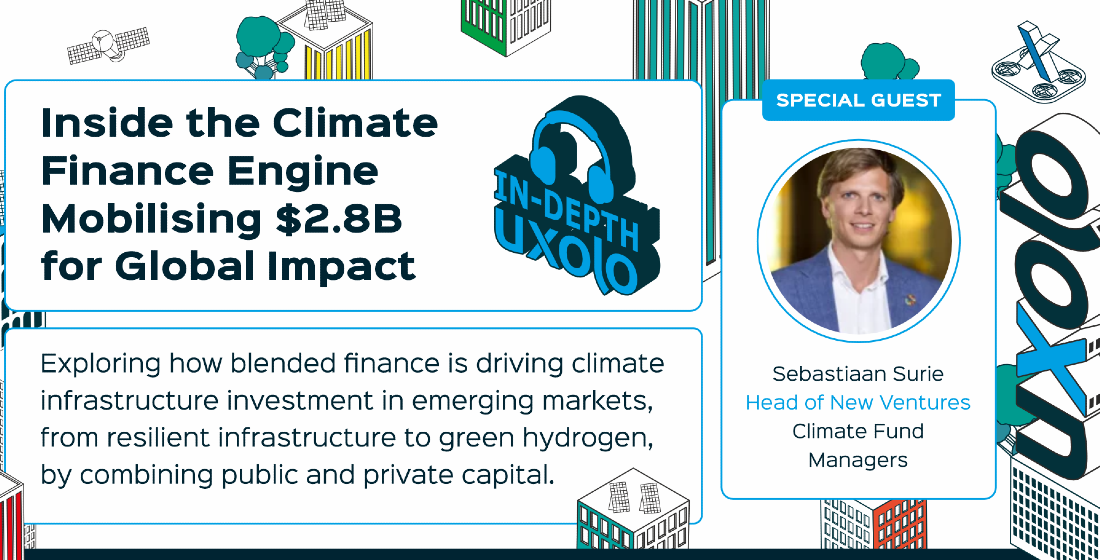Uxolo Development Finance Awards 2021: The DFI-backed infra super deals
In the second part of the inaugural Uxolo Awards we look at the best DFI-backed infrastructure deals of 2021 - projects and funding that are key to wider economic development worldwide.

There have been few years when development finance institutions have been tasked with more, although 2022-2023 will likely see an even greater uptick on the demand for DFI/MDB backing. Despite the enormity of fallout from the Covid-19 pandemic, innovation was rife in 2021, not only in pandemic-related funding but on all the SDGs.
Uxolo is recognising those achievements with the launch of its annual awards, an independent and editorially-driven take on the best of development finance in 2021. In the second part of our awards (click here for part one) we look at the best DFI-backed deals of 2021 across the various infrastructure and energy sectors that are so key to overall economic development in developing markets.
Uxolo will be presenting the awards at the Uxolo Global 2022: Development & Impact Finance hybrid event in the Hague on 11 October 2022. Winners will be contacted, but if you would like to attend on behalf of your agency to receive the award please contact sam.mcmanus@uxologlobal.com
Hydrogen Deal of the Year 2021
CEOG Hydrogen
Borrower: HDF CEOG
Debt: €171 million
Tenor: 20 years
DFIs: AFD, EIB
Sponsors: Meridiam, SARA and HDF
Offtaker: EDF
Lenders: BNP Paribas, SMBC, BPI, EIB and AFD.
Equipment Suppliers: Hydrogen de France ( HDF ), McPhy
EPC contractor: Siemens
Public finance: ADEME
Advisors: Eight Advisory
Legal advisor (sponsor): Wilkie Farr & Gallhager
Legal advisors (lenders): Allen & Overy, Linklaters
The Centrale Electrique de l’Ouest Guyanais (CEOG) Power Plant in French Guiana is an innovative first-of-its-kind blended project financing for a large-scale solar hybrid incorporating green hydrogen with 128MWh of energy storage together with short-term battery storage. Upon completion it will be the world’s biggest hydrogen-based renewable energy storage facility.
French Guiana is situated in northern South America, close to the equator. It, therefore, boasts 12 hours of daylight throughout the year, which will allow the CEOG solar/green hydrogen power project to operate consistently as a baseload facility all year round.
Sponsored by Meridiam (60%), Hydrogene de France (HDF) (10%) and SARA (Societe Anonyme de la Raffinerie des Antilles, Groupe Rubis) (30%) the cutting-edge plant is designed to provide electricity 24 hours a day and will deliver a 10MW baseload during the day and 3MW at night to 10,000 homes in Western Guiana.
The pioneering project combines a 55MW photovoltaic plant and a 16MW high-pressure alkaline electrolyser to break water into hydrogen and oxygen using photovoltaic electricity. Mass storage of energy in the form of hydrogen, CEOG is the alternative to a classic diesel power plant. CEOG will produce 100% renewable, stable and cheaper electricity by preventing the combustion of approximately 12 million litres of diesel and offsetting approximately 39,000 tonnes (t) of carbon dioxide (CO2) emissions a year. CEOG is fuel free, noise free and only produces electricity and steam. The CEOG project represents a decisive milestone in the industrialisation currently taking place in the hydrogen sector.
The project is scheduled for commissioning in April 2024. CEOG is already being duplicated, on a smaller level, in countries including Mexico, Australia, Indonesia and regions of Africa and the Caribbean. The project is also targeting primary markets, islands and other non-interconnected regions where the energy supply is based on expensive fossil fuel generation.
Power will be injected into the Guyanese electricity grid and its production will be governed by a 25-year PPA contract with French utility EDF and has an average levelised cost of energy (LCOE) of €380-400/MWh over the course of the PPA. French manufacturers McPhy and HDF will supply the electrolysers and fuel cells respectively. Siemens Energy has been awarded the engineering, procurement, and construction (EPC) contract for the CEOG power project. Siemens Energy will also provide operation and maintenance services over a period of 25 years, including remote control services for the plant.
The €171 million project includes three tranches, a €105 million project financing, provided by SMBC, BNP Paribas, CIC, Bpifrance, and two development finance tranches, provided by the EIB and the Agence Francaise de Developpement (AFD). The project will also benefit from subsidies granted by the French Environment and Energy Management Agency (ADEME). The project has a debt-to-equity ratio of around 78:22. The project partners reached financial closure in September 2021 and launched construction in the same month.
The financing has a tenor of around 20 years, although the debt provided by the EIB has a tenor of more than 20 years, which allowed the sponsors to accept a lower tariff for the project. The project will contribute to the EIB's priority objectives for energy sector lending related to renewable energy sources and transversal objectives of climate action as well as social cohesion
Water Deal of the Year 2021
Bita Water
Borrower: Ministry of finance of the Republic of Angola
Deal type/volume: $1.08bn ECA and World Bank-backed project financing
Tenor:13.25 - 15 years
Bookrunners/MLAs: Santander, Standard Chartered, Société Générale, Crédit Agricole CIB, BNP Paribas, Helaba, Credit Suisse
ECAs: Bpifrance
Guarantors/ DFIs: ATI, World Bank, IBRD
Facility agent/Financial adviser: Standard Chartered
EPC: Soares da Costa, Saint Gobain, Elecnor, Sinohydro
Law firms: Allen & Overy, Norton Rose Fulbright
Tenor: World Bank facility: 15 years; BPI AE facility: 13.25 years
Date signed: June 2021
Access to clean drinking water is a perennial concern for the African continent. According to the UN, on a global scale, half of the people who drink water from unsafe sources live in Africa. In Sub-Saharan Africa, only 24% of the population have access to safe drinking water, and 28% have basic sanitation facilities that are not shared with other households. A country particularly vulnerable in this regard is Angola, which the World Bank ranks 138 out of 140 for reliability of water supply. As such, the $1 billion Bita Water project in Angola deserves to be recognised for its part in helping to reinforce and extend access to water.
The development objective of the Luanda Bita Water Supply Guarantee Project is to improve access to potable water service in selected areas of Luanda by mobilising commercial financing for the Government of Angola. The first phase of the Bita Project will develop water supply infrastructure to supply currently unserved urbanised and urbanising areas of South Luanda. The water infrastructure project comprises a water treatment plant, a transmission system, water storage facilities, distribution centres and installation of new networks and metered connections.
The epitome of a blended finance transaction – incorporating an ECA, MFIs, international commercial banks and insurers, it is the first attempt for mobilising commercial financing in the water sector since the oil crisis in Angola. This project is significant as a relatively rare example of blended finance at scale, with World Bank / ECA guarantees and ATI insurance instrumental in amplifying investor appetite and comforting the banks, paving the way for similar big-ticket blended finance projects in sub-Saharan Africa.
The landmark project is funded by two loans: a $910 million facility supported by a World Bank IBRD guarantee (along with ATI guarantees) and a $165 tranche backed by the French export credit agency, Bpifrance. This project lays claim to being one of largest single term loan financings provided by commercial banks for an African sovereign during 2021, and in fact sets a global record as the biggest World Bank guaranteed financing. The loan is expected to have a final maturity of 15 years with a three-year grace period to match the construction profile. The financing closed in June 2021.
“Of course, there have been various other successful MDB, DFI or ECA supported transactions to support infrastructure projects in Africa in the past. However, this is the first transaction where a group of different stakeholders, including the World Bank, Africa Trade Insurance, Bpifrance and international banks have come together to support a common objective, which was to finance the BITA project of the Government of Angola. The whole structure is being tested for the first time. That's what makes this deal special,” said Alper Kilic, global head of project and structured export finance, Standard Chartered Bank, talking to Uxolo last September.
For the IBRD tranche, Standard Chartered Bank acted as sole co-ordinator and structuring bank, joint underwriter and joint initial mandated lead arranger (IMLA), BNP Paribas as joint underwriter, joint bookrunner and joint IMLA and Credit Agricole CIB as joint IMLA. Societe Generale and Credit Suisse acted as MLAs. Norton Rose Fulbright acted as legal counsel for the borrower and Allen & Overy acted for the lenders. Crucially, this loan is also guaranteed by the African Trade Insurance Agency (ATI) of up to $351 million . For the Bpifrance-guaranteed tranche, Standard Chartered acted as structuring and co-ordinating bank, bookrunner and MLA. Santander and Helaba Bank also came in as MLAs into this facility.
Ground Transport Deal of the Year 2021
Kekava Bypass
Borrower: AS Kekava ABT
Sponsors: TIIC 2 S.C.A SICAR (80%), ACB (10%), Binders CBF SIA (10%)
Debt: €122 million (also €9 million equity bridge)
Tenor: 21 years
Lenders: EIB, NIB, Luminor Bank
Lender counsel: Linklaters
Sponsor counsel: Loyens & Loeff
Financial close: July 2021
The first large-scale public private partnership (PPP) in the Baltics, the €122 million project includes construction of a new, approximately 14 km-long bypass to Kekava, with four major interchanges as well as sections with lanes for local traffic.
The Kekava Bypass will be the first project in the Baltics to be implemented according to a DBFO model, and is a viable template for future ground transportation projects in small EU nations. “This project is very important not only for Latvia's economy, but also for residents of the area,” says EIB Vice-President Thomas Östros. “The fact that this is the first public-private partnership of this scale in the Baltics opens the way for similar projects in the future.”
The public partner for the project is the State Ministry of Transport, on whose behalf the project has been negotiated and will be implemented by Latvijas Valsts Celi (LVC, Latvian State Roads). As part of the PPP agreement, practically all risks that may arise during design, construction or maintenance (such as errors in the design and construction process creating additional costs) will be borne by the private partner throughout the whole period of the PPP contract. Any expenses that may incur during the contract period in addition to any errors or omissions in the design, construction, maintenance or financing process will be the expenses of the Private Partner and the state will not pay for them.
An off-balance sheet approach gives the Latvian state fiscal headroom as it does not need to take on additional debt to finance the project, which avoids placing excessive burden on the state budget in the medium term. Long-term, the PPP agreement reduces the likelihood that Latvia will violate EU requirements on the limits of the state budget deficit if it were inclined to borrow for future large-scale projects.
The EIB will lend to the Kekava ABT AS special purpose vehicle on a 50/50 basis together with the Nordic Investment Bank (NIB) to support the project mandated by the Latvian Ministry of Transport. The EIB's European PPP Expertise Centre EPEC supported Latvian State Roads in the early stages of preparation for the public-private partnership to ensure alignment with European best practice.
The borrower, AS Kekava ABT, has been created by, and is owned by a consortium that consists of the Luxembourg-registered infrastructure fund TIIC 2 S.C.A. SICAR (80%) as well as Latvian construction firms AS A.C.B. (10%) and CBF SIA Binders (10%).
The total period of the partnership contract is up to 23 years. Of these, the construction period is no more than three years for design and construction. The availability period during which the private partner fully ensures the daily maintenance of the constructed road and the renewal of the road surface is not more than 20 years. The debt-to-equity ratio is understood to be 90/10, with interest on senior debt up to 3% and an expected internal rate of return (IRR) up to 15%.
Air Transport Deal of the Year
Almaty Airport Expansion
Borrower: Almaty International Airport JSC
Sponsors: Kazakhstan Infrastructure Fund C.V. (KIF), TAV Havalimanlari Holding A.i. (TAV Airports)
Debt: $450 million
Lenders: EBRD, IFC, Eurasian development Bank, DEG
The biggest DFI-backed private investment into airport infrastructure in Kazakhstan and Central Asia to date, the Almaty Airport Expansion project is expected to bolster Kazakhstan's links to the world and, in doing so, create thousands of jobs across the Kazakh economy, while bringing the Almaty Airport up to international airport infrastructure standards.
It will also set a new standard for environmentally friendly airport construction in Kazakhstan. The airport will be the first in Central Asia certified under IFC's Excellence in Design for Greater Efficiencies (EDGE) program, which recognises environmentally friendly buildings. TAV Airports will apply EDGE standards in resource efficiency through the use of high-grade insulation materials, water-efficient equipment and advanced practices for reducing noise, light, waste and emissions of greenhouse gases and air pollution, in line with the recommendations of the International Civil Aviation Organisation (ICAO).
A $450 million financing package for the airport's owners, a consortium led by Turkey's TAV Airports, will support the construction of a new international terminal at the airport, the busiest air transportation hub in Central Asia.
IFC is providing a financing package to Almaty International Airport that totals $222.2 million and comprises a $150 million loan from IFC's own account and $72.2 million from IFC's Managed Co-Lending Portfolio Program. The European Bank for Reconstruction and Development (EBRD) is also providing a $150 million loan. As well, IFC and EBRD jointly mobilised parallel loans by DEG, the German development finance institution, and the Eurasian Development Bank (EDB) valued at a total of $77.8 million.
The project sponsors are TAV Airports (85%) and Kazakhstan Infrastructure Fund C.V. (KIF) – managed by VPE Eurasia GP Limited – (15%). The financing will support significant upgrades by TAV, a long-term IFC client, and the construction of a new international terminal. That is expected to help strengthen Kazakhstan's connectivity and economic competitiveness, positioning the country for a stronger post-Covid recovery.
"Kazakhstan's path to sustainable development lies in transitioning into a diversified, export-led economy, which requires better connectivity, and the support of international strategic players who bring investment, global expertise, and international best practices," said Cassandra Colbert, IFC Regional Manager for Central Asia. "This project – the largest ever foreign direct investment in the country's airport sector – ticks all those boxes, while also highlighting the great potential in the region's aviation industry."
Municipal Deal of the Year 2021
Smart Luz
Borrower: Rio Smart Lighting S.a.r.l
Sponsors: Arc Comércio Construção e Administração de Serviços, Green Luce, High Trend Brazil , Salberg, Proteres
Size: BRL925 million ($187.6 million) bond issue
Maturity date: November 2032
Settlement date: 8 November 2021
Coupon: 12.25%
Credit rating: Fitch (AA+) Moody's Aa1
Guarantor: DFC
External ESG audit: Sustainalytics
Lead manager, Underwriter and bookrunner: Goldman Sachs
Legal advisor (borrower): White & Case: White & Caseadvised
Legal advisor (lender): Latham & Watkins
Model auditor: Mazars
In a country that has long struggled to produce PPP success stories, Brazil’s street lighting programme is a rare bright spot, Rio Smart being the biggest street lighting PPP in the country to date. Guaranteed by the US International Development Finance Corporation (DFC), the 20-year PPP focuses on modernising and replacing many of Rio de Janeiro’s inefficient sodium mercury vapour lamps that dominate the city’s existing lighting estate, while also enhancing broader data connections and integration.
The Smart Luz concession covers 450,000 lights and requires BRL1.4 billion ($255 million) of investment, which also includes the installation of smart city infrastructure, such as wifi points, traffic lights, cameras, smart drains, waste sensors and traffic management systems. The modernisation will upgrade the city to climate-friendly infrastructure that will significantly reduce the city’s public lighting’s consumption of electricity and promote cost savings, while enhancing reliability and resilience. The project is expected to save $22 million in reduced energy costs each year.
The first-of-a-kind transaction is particularly notable for its complex capital markets financing, which comprised a BRL925 million ($187.6 million) Goldman Sachs-led offshore repackaging of a domestic debenture issue with a guarantee from DFC. The debenture was issued by Smart Luz, a Brazilian special purpose vehicle established by the sponsors. The ‘market-unlocking’ structure has the potential to open similar Brazilian projects up to secure financing in international debt capital markets.
Underpinning this project is the Contribuicao para Custos do Servico de Iluminacao Publica (COSIP), roughly translated as the Social contribution to the cost of public lighting service. In essence, this can be understood as a surcharge on end-users’ electricity bills that is collected by Caixa, the Brazilian state-owned lender, and remitted to concession companies. The concession companies in turn have to meet installation and performance milestones, though ratings agencies have generally viewed performance risk as highly manageable.
"The Rio de Janeiro Smart Lighting project is a textbook example of successful sustainable financing; made possible by all stakeholders aligning with a common goal," said Yan Herreras, Vice President of finance at Smart Luz. "All members of the team were crucial to accomplishing what was an ambitious mission to transform the city of Rio."
White & Case advised the Smart Luz consortium – formed by the companies High Trend, Proteres Participacoes, Arc, Salberg and Green Luce. Goldman Sachs was global coordinator, sustainability bond structuring agent and initial purchaser on the issuance.
Onshore Wind Deal of the Year 2021
Lotus Wind
Sponsors: Rebova, PCC1
Debt: $173 million green loan
Lenders: JICA, ADB, Export Finance Australia, Bank of China, Societe Generale, Triodos Bank
Tenor: 15 years
Sponsor Counsel: Allen & Overy; VILAF
Lender’s legal adviser: Mayer Brown
Environmental advisor: ERM
Sponsors of the VND5.8 trillion ($252.4 million) Lotus wind power project in Vietnam – Japanese IPP Renova (60%) and local construction outfit Power Construction No 1 (PCC1 (40%)) – closed on a limited recourse debt package to fund the development of the 144MW portfolio.The deal is the first wind project financed by development and international commercial banks on a limited recourse basis in Vietnam and ADB’s first wind financing in Vietnam.
The Lotus wind portfolio comprises three 48MW onshore wind power projects: the VND1.973 trillion 48MW Lien Lap project; VND1.913 trillion 48MW Phong Huy; and VND1.911 trillion 48MW Phong Nguyen. Danish wind power company Vestas Wind System was awarded the contract to install 36x V150-4.2MW wind turbines.
The project companies each have 20-year PPAs with state-owned monopoly electricity distributor Vietnam Electricity (EVN) under a feed-in tariff (FIT) of $0.085 per kWh. However, the projects must achieve commercial operations by 31 October (2021) to be eligible for the FIT regime.
The $173 million blended financing was provided by MLA and bookrunner ADB, JICA and Australian ECA, Export Finance Australia (EFIC), alongside commercial banks from Hong Kong, France and the Netherlands. Pricing was between 300-500bp over Libor.
The 15-year facility comprises three tranches: a $35 million A loan put up by ADB; an $81 million facility funded by Bank of China (HK and Macau), Societe Generale, and Triodos Groenfonds; and a $57 million parallel loan funded by JICA ($25 million) and EFIC ($32 million). Project sponsors expect the first drawdown this month or next. Advisers to the project included Allen & Overy and VILAF as sponsor counsel, with Mayer Brown acting for the lenders and ERM providing environmental advisory.
Large Hydro Deal of the Year 2021
Kinguele Aval
Sponsors: Meridiam, Gabon Power Company
Equity: €25 million
Debt: €179 million
Tenor: 19 years
Lenders: AfDB, Sustainable Energy Fund for Africa, IFC, Canada-IFC Renewable Energy Program for Africa, DBSA, Africa Growing Together Fund, EAIF
Financial adviser: Finergreen
Sponsors’ legal adviser: Gide Loyrette Nouel
Lenders’ legal adviser: Allen & Overy
Independent engineer: Sinohydro
Lenders’ insurance adviser: Willis Towers Watson
Model auditor: Mazars
Lenders’ technical adviser: Mott MacDonald
Government legal adviser: Blakes
EPC contractor: Sinohydro
The Kinguele Aval hydroelectric plant is the first grid-connected IPP project in Gabon to reach financial close, raising significant project finance debt from a consortium of development banks. The 35MW project is sponsored by Meridiam Infrastructure Africa Fund (45%), Meridiam Infrastructure Africa Parallel Fund (15%), and Gabon Power Company (40%), an energy portfolio company owned by the Gabonese Strategic Investment Fund (FGIS) – Gabon’s sovereign wealth fund. Construction is underway on the project, which will be operated under a 33-year concession agreement that incorporates a 30-year PPA with national utility Societe d’Energie et d’Eau du Gabon (SEEG).
Structured via SPV Asonha Energie, the 19-year financing was led by the IFC and consists of a €153 million loan from the IFC, the AfDB, DBSA, and the EAIF. The IFC’s contribution is €55 million, which includes a €33 million senior direct loan and a $25 million concessional loan from the Canada-IFC Renewable Energy Programme for Africa. The AfDB provided €39 million, including a €20 million direct loan, €10 million from the Africa Growing Together Fund, and €9 million in concessional financing from the Sustainable Energy Fund for Africa. The DBSA and the EAIF provided €34 million and €25 million, respectively.
Ecological concerns were of key importance when closing the transaction. A spokesperson from Meridiam notes: “The greatest challenge was managing the impact on biodiversity since the dam will be built in a country rich in biodiversity. To manage the impact we first decreased the project’s footprint by downsizing its capacity by nearly half, from 60MW to 35MW. Then after detailed assessment of the natural and critical habitats, we devised tailored biodiversity action plan and biodiversity management plan in line with IFC performance standard, which involve an offset mechanism with the objective to reach no net loss for natural habitats and a net gain for critical habitats found in the project footprint.”
Kinguele Aval will benefit Gabon by supplying additional energy capacity and by galvanising the growth of the country’s IPP sector. Due to be situated on the River Mbei, the project will supply around 9% of Gabon’s power and lead to the decommissioning of thermal assets. Payments to the project from the offtaker have been delegated to a mobile money operator that collects prepaid electricity payments, giving sponsors and lenders important revenue security. The financing represents a crucial first step towards private sector participation in Gabon’s energy market.
Solar Deal of the Year 2021
Kom Ombo Solar
Sponsor: ACWA Power
Lenders: EBRD, OFID, AfDB, Green Climate Fund, Arab Bank
Debt: $114 million
Financial advisor: Synergy Consulting
Legal advisor: Baker McKenzie
Technical advisor: Sargent & Lundy
The $161.5 million project is backed by a 25-year PPA with an African record low solar tariff of $0.0248/kWh and is scheduled for commercial operation in Q3 2022. The Ministry of Economy signed the government guarantee for the project in January 2021 and then ACWA Power awarded a $127.5 million contract to Indian EPC company Sterling and Wilson a month later in February.
The debt package comprises loans of up to $36 million from the EBRD, $18 million from the OPEC Fund, $17.8 million from the AfDB, $23.8 million from the GCF, and $18 million from Arab Bank. The interest margin is 375bp over Libor, except for the GCF loan which is 200bp.
The AfDB had initially approved a much larger $27.2 million loan for the scheme on 4 March 2021 but scaled down as other lenders confirmed their tickets. The EBRD led the way in September 2020 with its own approval of a $40 million senior loan and a $14 million equity bridge loan, and the European DFI remained the largest lender on the deal. Arab Petroleum Investments Corporation (Apicorp) also put up a $33.5 million ticket under the equity bridge loan for the project.
Transition Energy Deal of the Year 2021
Basrah Gas
Borrower: Basrah Gas Company
Debt: $360 million pre-export finance through an IFC A/B loan structure
Tenor: 5-years
DFI/MDB direct loan: IFC
MLA: Societe Generale
B-loan lenders: Bank of China, Citi, Deutsche Bank, Industrial and Commercial Bank of China, Natixis, Sumitomo Mitsui Banking Corporation, Societe Generale, Standard Chartered
Lender counsel: Norton Rose Fulbright
The Basrah Gas Company (BGC) $360 million financing is an excellent example of the multilateral bank sector – in this case IFC – combining with the commercial bank sector to make a truly meaningful difference in the hydrocarbon energy transition sector. And in an unusual and highly effective arrangement the financing has been structured as a pre-export finance (PXF), in what is believed to be the first of its kind in Iraq.
The transaction is structured as a robust PXF, whereby export proceeds (condensate sales) paid on an offshore collection account will be used to repay the facility. The loan is without recourse to, or guarantees from, any of the shareholders.
The loan comprises three tranches: a $137.76 million A loan from IFC's own account; a $180 million B loan syndicated to eight international banks; and a $42.24 million loan through IFC's managed co-lending portfolio programme, a platform that allows institutional investors to participate in IFC's loan portfolio.
The transaction supports one of the largest gas flaring reduction projects in the world, helping to improve energy access, prevent associated greenhouse gas (GHG) emissions and support a more resilient, sustainable energy sector in Iraq.
It will also help finance the increase of BGC's processing capacity with a new gas processing plant, the Basrah Natural Gas Liquids (BNGL) facility, part of a broader expansion plan to increase BGC’s raw gas processing capacity from 1 billion standard cubic feet per day (bscfd) currently to 1.4 bscfd by 2024. It aims at avoiding more unnecessary flaring and associated GHG emissions by around 10 million tons per annum.
In addition, the project will support Iraq's transition to a lower carbon path and improve access to a domestic energy source, helping the country meet its growing power needs. Iraq also has growing electricity needs, which are largely met by imports given the lack of adequate infrastructure to capture and process natural gas (about 70% of all natural gas produced in the country is currently flared). Capturing associated gas for subsequent use will help Iraq reduce overall emissions while using it for energy generation and LPG/condensate production and exports.





